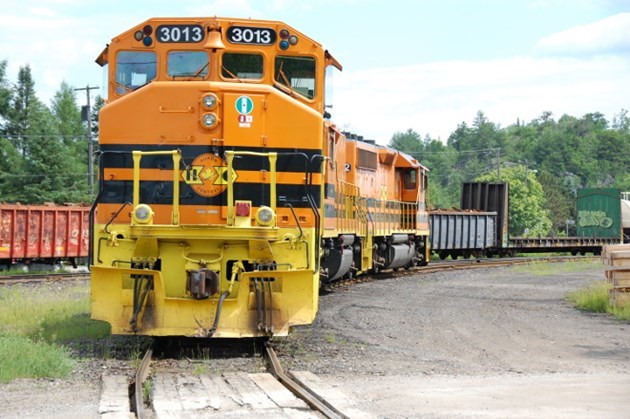Freight service between Sault Ste. Marie and Sudbury is again in jeopardy.
Genesee & Wyoming Canada (GWC), the Montreal parent company of short-line railroader Huron Central Railway is threatening to discontinue operations in early 2020.
The rail carrier insists it needs $40 million over five years to fix and maintain the track and infrastructure since the freight volumes alone on the 278-kilometre line aren’t enough to run profitably.
The Huron Central Railway (HCRY) hauls steel, forest products and chemicals for Algoma Steel in Sault Ste. Marie, Domtar in Espanola and EACOM in Nairn Centre. The railway employs about 40.
“For the last few years, we have worked diligently with elected officials in Toronto and Ottawa and a dedicated team of local leaders to develop a long-term strategy to sustain HCRY,” said Genesee & Wyoming Canada president Louis Gravel, in an Oct. 7 statement.
The rail carrier said it has a cost-sharing model in mind involving both levels of government that will sustain the Huron Central over the long haul.
“While both the provincial and federal governments made commitments to support our long-term plan, the only recent funding received has been a modest investment from the province to temporally sustain operations,” said Gravel.
This is the third time in ten years that the company has warned it might drop service. In 2009, the company gave a 30-day notice, with a series of extensions, until the City of Sault Ste. Marie took the lead and managed to package a $33-million subsidy for track and bridge repairs.
Last fall, the provincial government provided $980,000 in stop-gap funding to keep the service running for another year while negotiations continued with province on a long-term deal.
Those talks, evidently, have provided no solution for the railway.
In his statement, Gravel said this funding only provided a “minimum level of emergency repairs needed to sustain the safe operation of the line while we pursued the longer-term solution.”
Gravel said his team will continue discussions with Queen’s Park and Ottawa leading up to the deadline but pointed out in the company’s release that some of the railroad’s customers, notably Domtar’s Espanola plant and Algoma Steel, have been the recent beneficiaries of the government subsidies.
“While they recently announced substantial investments to help some of HCRY’s main customers, the railway that supports their supply chains and access to global markets hangs in the balance.
“We have never been in the business of closing railways and do not take this decision lightly, as we recognize how important HCRY is to our valued employees and the communities and businesses served since we began operating the line in 1997. The need for this capital investment predates that time, but we remain hopeful that it can still be secured prior to our cessation of service.”
The Huron Central line is owned by CP Rail, which contracts Genesee & Wyoming Canada to feed regional freight onto its trans-Canada line at Sudbury. CP has shown no inclination in the past to invest in the track.
GWC’s Connecticut-headquartered American parent, Genesee & Wyoming, was acquired over the summer by Brookfield Infrastructure in an $8.4-billion deal.
The railroader has operations in Canada, Britain and Australia consisting of 120 short-line railroads that provide feeder freight service to the larger Class 1 rail operators.
Monitoring the situation closely is the Sault Ste. Marie Chamber of Commerce.
The viability of short-line railways, in particular the Huron Central, has been a priority issue for the business advocacy group.
In an emailed response to Northern Ontario Business, the Sault chamber noted it has frequently talked with the Railway Association of Canada on the challenges faced by short lines and has galvanized support from other chambers at the regional, provincial and national levels to petition the federal transportation minister “to do more to support Canada’s short-line rail system.”
“We noted at that time that the benefits of moving freight by rail are numerous,” said the chamber.
“Rail transportation is generally four times more fuel efficient than truck. In addition, a single freight train removes more than 300 tractor trailers from the province’s congested highway and road network, minimizing wear and tear on publicly funded assets and improving transportation.”
Last month at the Canadian Chamber of Commerce’s Annual General Meeting in Saint John, N.B., the Sault chamber supported a policy resolution recommending that Ottawa create a capital funding program of low interest loans for short-line operators and establish a tax credit program to assist these operators in making capital investments.
That resolution passed and is part of the advocacy priorities of the Canadian chamber and its cross-Canada network.




